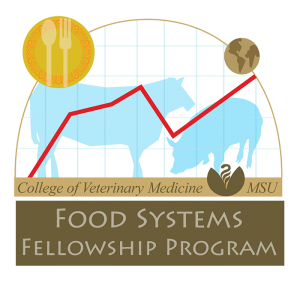This collaborative program has provided more than 125 students with experiences that prepare them to face the future challenges to animal and human health.

For ten years, the Summer Food Systems Fellowship Program has been introducing students to the breadth of career possibilities for veterinarians. It also has provided more than 125 students with experiences that have prepared them to face the future challenges to animal and human health.
Industry partners provide meaningful and relevant food systems experience to students through summer employment. Since the program was launched, 23 partners have helped design and implement the projects and also provided matching funds to support the summer salary for each student fellow. Students complete projects that are designed to broaden their vision of and experiences in the food industry and to benefit the industry and the industry partner.
“Veterinarians are integral to ensuring a wholesome and safe global food supply, and initiatives like the Food Systems Fellowship Program help prepare future practitioners for this vitally important challenge,” said Dan Grooms, DVM, PhD, chair of the College’s Department of Large Animal Clinical Sciences. “Not only do our partners provide scholarships, but they also support students by giving them experiences that they will carry with them throughout their careers. These experiences will prove invaluable now and down the road.”
Partners ensure the supply of well-trained veterinarians to work in the food animal industry
In 2015, Merck Animal Health awarded three $5,000 scholarships and internship opportunities to student participants.
Recipients Jared Lyzenga and Audrey Lounsbery are in the DVM Class of 2017, and Lora Anderson is in the DVM Class of 2018 and is also pursuing a Master’s in public health.
“We, at Merck Animal Health, recognize that food animal veterinarians are critical to our future and our ability to feed the world,” said Norman Stewart, DVM, technical services manager for Merck Animal Health. “We are committed to investing in their futures through programs such as this – ones that provide real-world experiences and help develop the next generation of industry leaders, as well as reinforce the importance of the science of healthier animals.”
The food animal industry faces issues of animal health, human health, and economic health. Veterinarians continue to contribute in the realms of public policy, crisis management, disease containment, and more.
“The College is proud to have one of the nation’s most extraordinary programs for students interested in the food animal industry,” said John Baker, dean of the College of Veterinary Medicine. “I thank all of our industry and governmental partners for making a difference in education and the future of veterinary medicine. They are all helping to develop the next generation of leaders in discovery and problem-solving in the food animal industry.”
